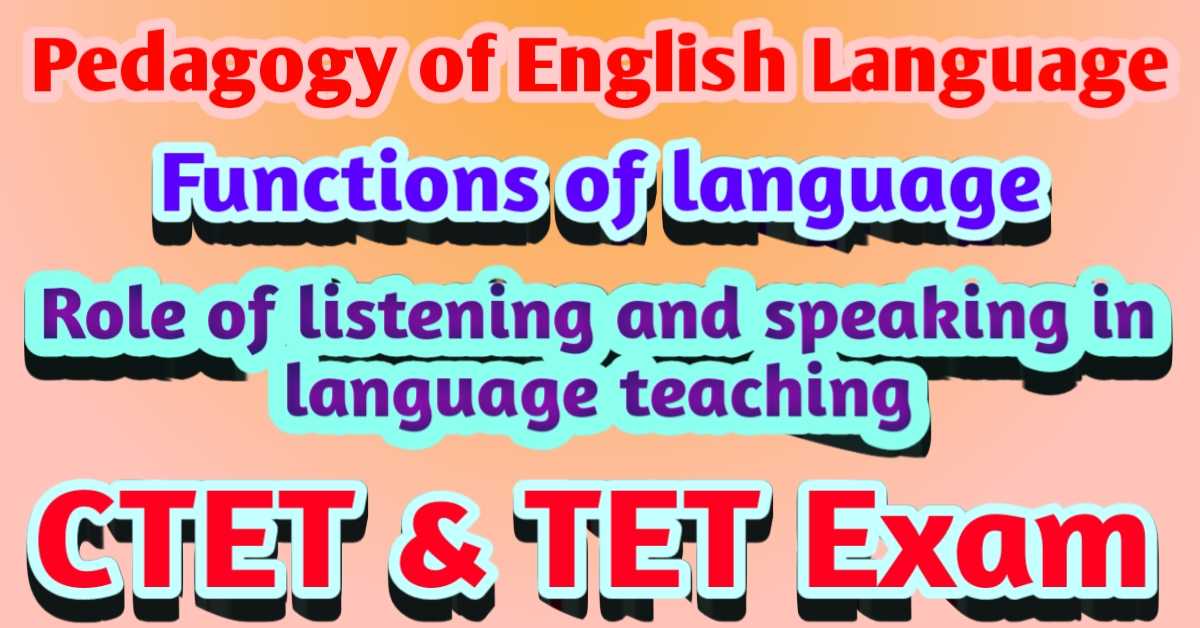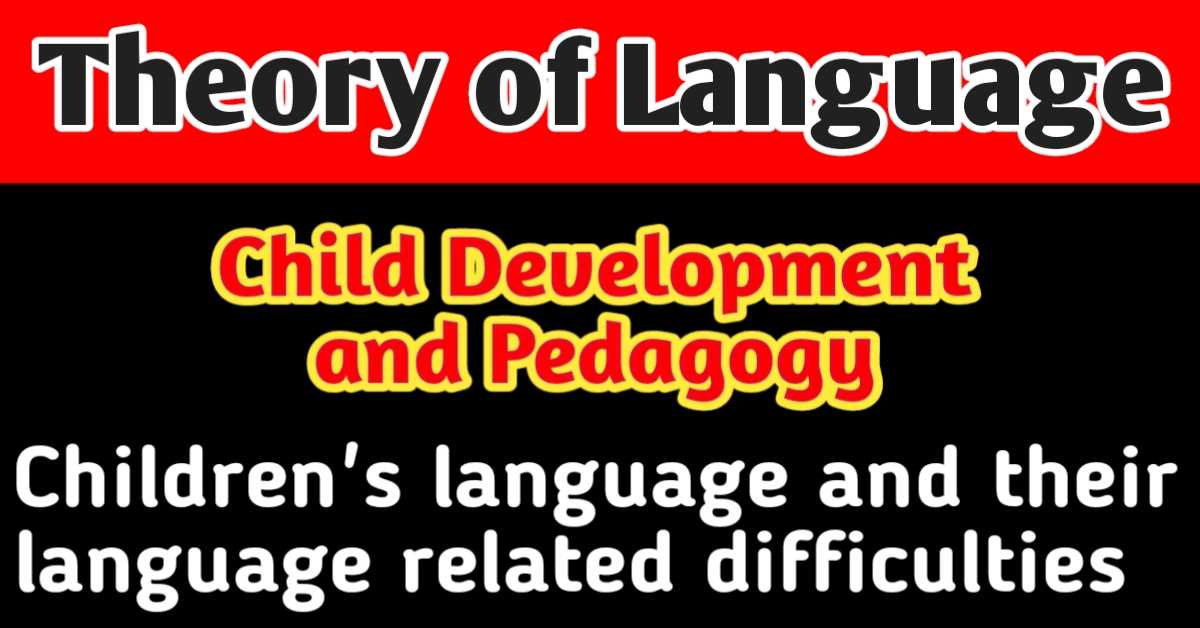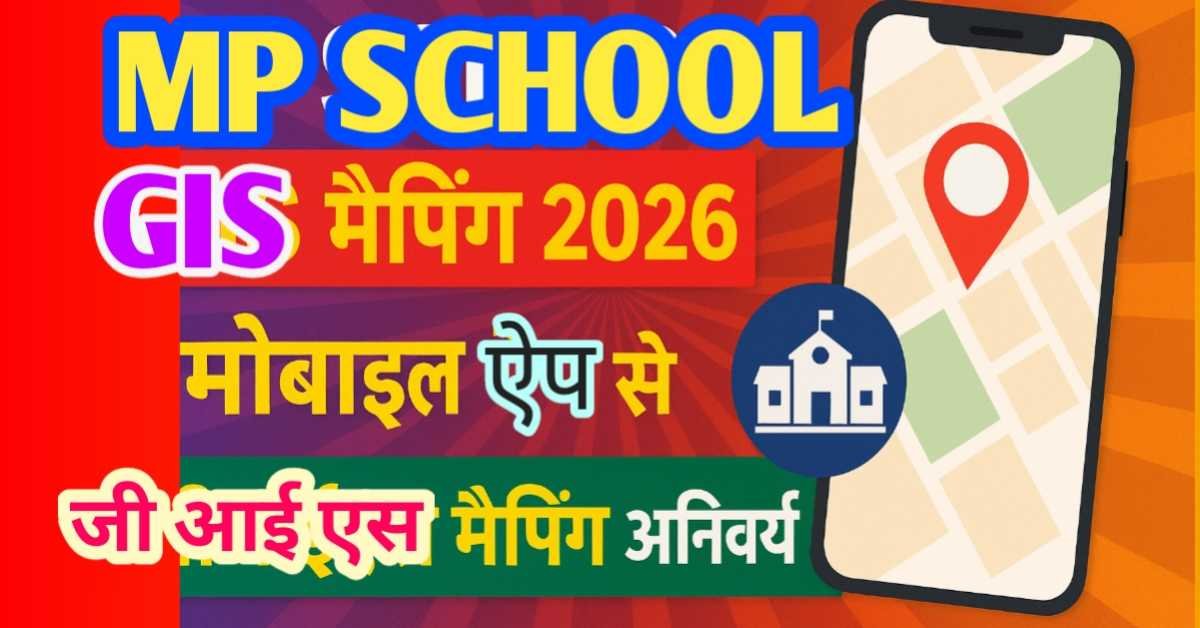
Role of listening and speaking in language teaching | Functions of language | How do children use language? | pedagogy
Linguistic Skills - There are four main stages of linguistic skills, only after passing through which a child is able to mature his language skills.
These are linguistic skills.
(i) Hearing
(ⅱ) Speaking (Expression)
(iii) Reading
(iv) Writing.
Therefore, language teaching is based on these four skills.
(1) Listening skill - It means that the meaning of conversation is understood by listening to sentence narration, question-answer, story events, journeys and other things.
(2) Speaking skill (means expression) - Under this skill, mutual conversation, words, tying words in sequence, creating effect in language and etiquette, standard language. To use is to express one's point in detail and in brief.
(3) Reading skill- In this skill, reading aloud, silent reading, methods of reading are included.
(4) Writing skill- Under this skill, the beautiful form of writing, punctuation marks and various genres of writing and the mechanical aspect of writing are presented.
To learn the above skills of English, Hindi and Sanskrit language and gain proficiency in them, the child can achieve excellence through the practice of the above.
Role (need) of listening and speaking in language teaching
(1) Hearing— Hearing means listening which means understanding what is heard and keeping it for later. Listening skill does not only include hearing the sound but it also includes everything that we hear, recognize it, understand it and remember it after receiving the meaning. Listening has the most important place in language teaching. Every language like English, Hindi, Sanskrit etc. has its own sound system, which is different from the sound system of other languages. This difference also affects the pronunciation and reading of the standard language. Therefore, speech skills can be properly developed only after proper mastery over the basic skills.
Listening contributes more to the learning process than reading. In ancient times, only word of mouth was the main means of exchange of ideas, in which this knowledge was transferred through hearing through stories, poems and songs. Students used to memorize the lessons after listening to the teacher. This process continues even today but with it radio, television, video etc. have become more influential. Listening skills are closely related to proficiency in various literary fields.
Main points of hearing ability in children
(ⅰ) To recognize the feelings or intentions of the speaker.
(ii) Anticipating what is being said.
(iⅱ) Listening for the main thing.
(iv) Listening for detailed description.
(v) Listening to follow oral instructions.
(vii) Listening to infer and draw conclusions.
(viii) To evaluate and estimate the evidence of the speaker.
(ix) To reveal differences between facts and imagination.
(x) Listening to absorb the desired and meaningful material from the undesirable and meaningless material.
(xi) To use reference points for understanding.
(xii) Hearing in the context of past experience.
(xiii) To critically analyze what was said.
(xiv) Critical, creative and contextual listening.
(xv) Listening to learn new things and use them in daily life.
(xvi) Listening to differentiate between different vowel sounds and understand their meaning.
(xvii) Listening to imitate to acquire the ability to speak.
(xviii) Listening to acquire social, economic and environmental knowledge.
Methods of hearing skill development
To develop listening skill, this skill should be developed according to the following points-
(1) Recognizing similar sounding words- In the development of listening skills, efforts are made to identify similar sounding words under the exercises of sound recognition. Through such exercises, students' ability to recognize the difference in sounds is developed. This exercise is done through word pairs, word sets, phrases and sentences.
(2) Methods of developing listening skills—
(i) Imitation practice through listen and speak.
(ii) In the practice of look and listen, picture books are used as the basis and medium and poems and stories are narrated.
(iii) By practicing dictation.
(iv) To listen carefully and understand what is said.
(3) To reinforce listening with practice material.
(ⅰ) conversation
(ⅱ) Syntax
(iii) Question and Answer
(iv) Story
(v) Description of the incident
(vi) Experience Statement
(vii) Visual description
(viii) Travel description
(ix) Picture description
(x) Poetry recitation
(xi) Conversation
(xii) Acting or drama
(xiii) Debate competition
Click below link to read about pedagogy of Language
1. What are language and mother tongue? Definitions
2. Language learning tendencies - Curiosity, Simulation and Practice, Pedagogy of Language
3. Language skills - Basis of writing and communication Required competencies for language knowledge
4. Principles of Language Teaching - CTET and TET Exams
5. Elements of language Acquisition. Factors affecting language acquisition
हिन्दी भाषा एवं इसका शिक्षा शास्त्र के इन प्रकरणों 👇 के बारे में भी जानें।
1. भाषा सीखना और ग्रहणशीलता - भाषा और मातृभाषा क्या हैं? परिभाषाएँ
2. भाषा शिक्षा शास्त्र, बालकों को भाषा सिखाने हेतु महत्वपूर्ण तथ्य
3. भाषा की दक्षताएँ, लेखन एवं भाव संप्रेषण के आधार, भाषा सीखना एवं सुधार
4. भाषा ग्रहणशीलता एवं भाषा ग्रहणशीलता के तत्व- भाषा ग्रहणशीलता को प्रभावित करने वाले कारक
5. भाषा शिक्षण के सिद्धांत
6. भाषा शिक्षण में बोलने व सुनने की भूमिका, श्रवण कौशल
इन 👇 प्रकरणों के बारे में भी जानें।
1. गणित शिक्षण से चिंतन एवं तर्कशक्ति का विकास करना
2. गणित अध्यापन के प्रमुख उद्देश्य, चिंतन शक्ति का विकास
शिक्षक चयन परीक्षाओं के प्रश्न पत्रों को यहाँ👇 से डाउनलोड करें।
1. संविदा शाला वर्ग 3 का 2005 प्रश्न पत्र डाउनलोड करें
2. संविदा शाला वर्ग 2 का 2005 का प्रश्न पत्र डाउनलोड करें
3. गणित शिक्षण से चिंतन एवं तर्क शक्ति का विकास
4. पाठ्यक्रम में गणित का स्थान- (गणित एवं इसका शिक्षा शास्त्र)
पर्यावरण का शिक्षाशास्त्र के इन 👇 प्रकरणों के बारे में भी जानें।
1. पर्यावरण की अवधारणा
2. पर्यावरण शिक्षा के उद्देश्य
3. पर्यावरण शिक्षा का महत्व
4. पर्यावरण शिक्षा के उद्देश्य
5. समेकित पर्यावरणीय शिक्षा क्या है, इसकी आवश्यकता एवं महत्व
6. पर्यावरण शिक्षा के सूत्र एवं दायित्व
7.पर्यावरण शिक्षा का विज्ञान एवं सामाजिक विज्ञान से सहसंबंध
इन 👇 प्रकरणों के बारे में भी जानें।
1. बाल विकास क्या है इसकी अवधारणा एवं परिभाषाएंँ
2. बाल विकास की विशेषताएंँ
3. विकास के अध्ययन की उपयोगिता- बाल विकास एवं शिक्षाशास्त्र
4. बाल विकास के अध्ययन में ध्यान रखे जाने वाली प्रमुख बातें
5. गर्भावस्था एवं माता की देखभाल
6. शैशवावस्था- स्वरूप, महत्वव विशेषताएँ
इन 👇 प्रकरणों के बारे में भी जानें।
1. विकास के स्वरूप
2. वृद्धि और विकास में अंतर
3. बाल विकास या मानव विकास की अवस्थाएँ
4. बाल्यावस्था स्वरूप और विशेषताएँ
5. किशोरावस्था- किशोरावस्था की विशेषताएँ
इन 👇 प्रकरणों के बारे में भी जानें।
1. बहुभाषिकता क्या है
2. संप्रेषण क्या है
3. शिक्षा मनोविज्ञान- प्रकृति और उद्देश्य
4. समाजीकरण का अर्थ
5. POCSO act क्या है
इन 👇 प्रकरणों के बारे में भी जानें।
1. उद्योतन सामग्री क्या होती है
2. किशोरावस्था का स्वरूप
3. प्रौढ़ावस्था एवं वृद्धावस्था काल
4. अधिगम क्या है? अधिगम की परिभाषाएँ एवं विशेषताएँ
5. विकास का अधिगम से संबंध
6. शारीरिक विकास क्या है? विकास की परिभाषा
7. शारीरिक विकास एवं इसे प्रभावित करने वाले कारक
8. गामक विकास - परिभाषाएँ, विशेषताएँ एवं प्रभावित करने वाले कारक
9. मानसिक विकास एवं इसे प्रभावित करने वाले कारक
10. संवेग कौन कौन से है? संवेगात्मक विकास को प्रभावित करने वाले कारक।
इन 👇 प्रकरणों के बारे में भी जानें।
1. भाषा विकास अर्थ, परिभाषा, चरण एवं प्रभावित करने वाले कारक
2. सामाजिक विकास के अभिकरण एवं इसे प्रभावित करने वाले कारक
3. मूल्य परक विकास (नैतिक विकास) क्या है? प्रभावित करने वाले कारक
4. सृजनात्मक विकास क्या है इसका महत्व एवं प्रभावित करने वाले कारक
5. सौंदर्य विकास क्या है? इसके सिद्धांत, सौंदर्य विकास के तत्व एवं प्रभावित करने वाले कारक
आशा है, उपरोक्त जानकारी उपयोगी एवं महत्वपूर्ण होगी।
(I hope the above information will be useful and important. )
Thank you.
लेखक
(Writer)
infosrf.com








